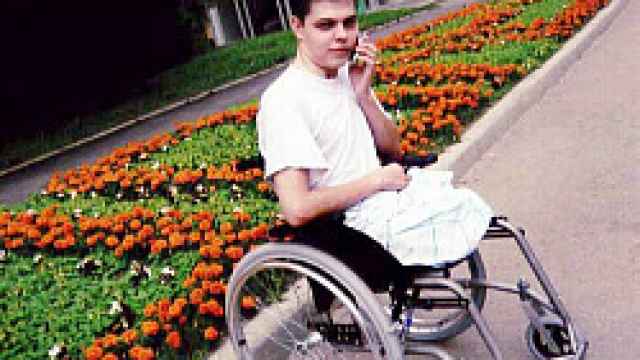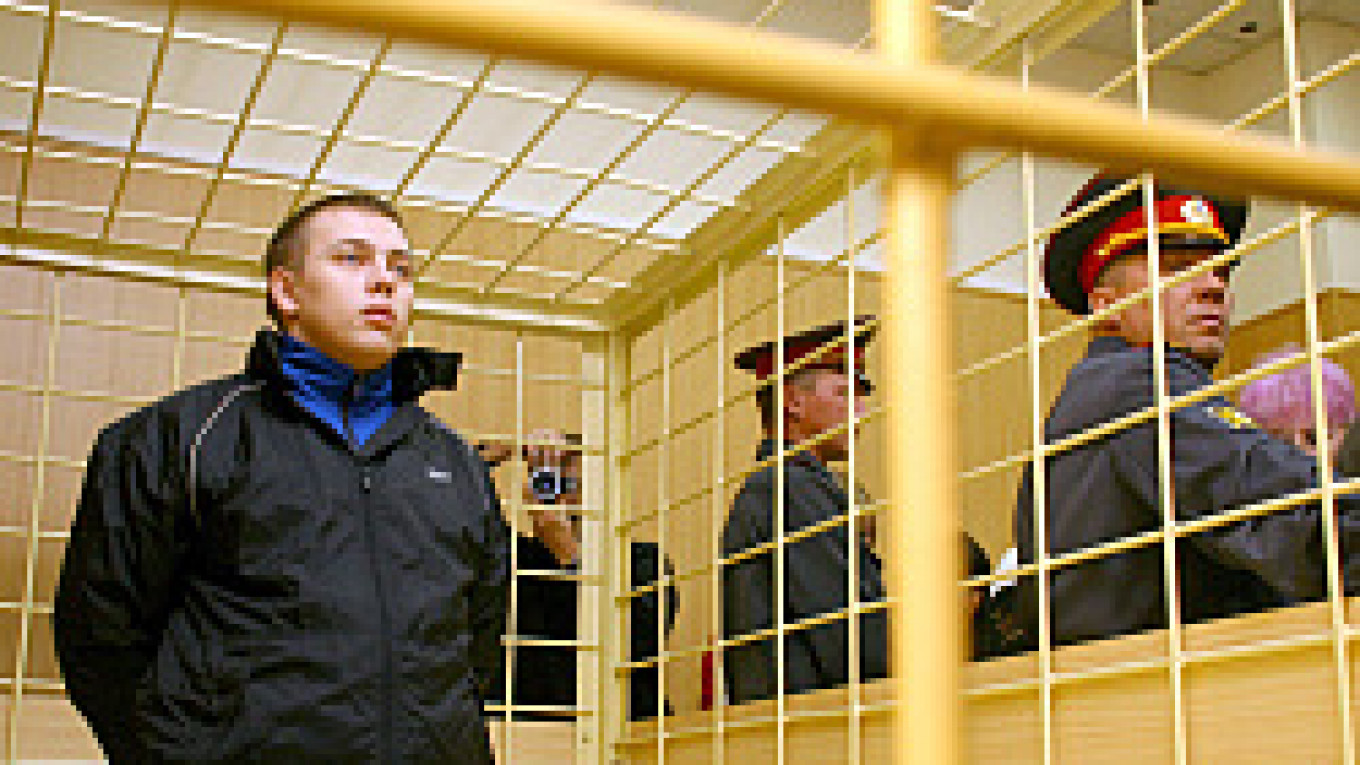Prosecutors showed that Sivyakov forced Andrei Sychyov, a first-year conscript at the Chelyabinsk Armor Academy, to squat for several hours while beating him last New Year's Eve. The incident led to the amputation of Sychyov's legs and genitals.
Sivyakov, who has consistently maintained his innocence, was convicted on five charges, including "exceeding authority, resulting in grave consequences," and sentenced to four years, less time served, in a medium-security penal colony. He has been in jail since mid-January.
Sivyakov was stripped of his rank and banned from holding a command position for three years. He was also ordered to pay 22,000 rubles ($825) to cover the cost of transporting witnesses and experts to the court.
"This is horrible," said Marina Muffert, Sychyov's sister, who burst into tears when the sentence was read.
"I called my mother in Moscow, and she was furious that Sivyakov had been given such a light sentence. Andrei isn't satisfied, either. He was angry at first, but then he buried his head in his pillow and said nothing."
Sychyov continues to undergo treatment at the Burdenko Military Hospital in Moscow and was unable to attend the trial, although his condition is no longer critical. His mother has been in Moscow with him since he was airlifted from Chelyabinsk in January.
Sychyov's lawyer, Yevgeny Belov, said the family was satisfied with the conviction, but would appeal for a stiffer sentence.
Muffert added that the family would also consider seeking damages in a civil suit against the Defense Ministry.
Some Sychyov supporters were less diplomatic. "This is all crap. I saw the bruises myself," said an officer at the academy who spoke on condition of anonymity. "Why did this take so long? They should have shot him at once."
Sivyakov's lawyer, Yelena Ustinovich, also vowed to appeal the verdict. "Such a light sentence only confirms that Alexander is not guilty," Ustinovich said.
"I have not yet spoken to Alexander, so we don't know if we will appeal the verdict, but Sasha is undoubtedly shocked. He did not commit this crime, and he is not guilty," she said.
As the court reviewed the evidence in the case Tuesday, Sivyakov smiled and chatted with his mother through the bars of the courtroom's holding cage. When the sentence was read, however, he was clearly stunned, and had difficulty responding to the judge. His mother, Natalya, ran out into the hallway in tears.
 Alexander Dybin / For MT Andrei Sychyov recuperating at the Burdenko Military Hospital in Moscow. | |
Two codefendants in the trial, Privates Pavel Kuzmenko and Gennady Bilimovich, were convicted of hazing a soldier of equal rank and given suspended sentences of 1 1/2 years, followed by one year of probation.
The Sychyov case became public in late January, and immediately caused an uproar across the country, culminating in calls for the resignation of Defense Minister Sergei Ivanov.
On Jan. 30, President Vladimir Putin ordered Ivanov to draft "legal and organizational measures" to boost what he termed "the work of education and upbringing" in the military.
Human rights groups and politicians have demanded an end to the draft and the creation of a professional military.
Vladimir Lukin, the national human rights ombudsman, said Tuesday that he was satisfied with the verdict, Interfax reported.
"The important thing is that this person has been found guilty," Lukin said. "I don't want to discuss the issue of how long he will be in prison. That is the court's prerogative. But it is important that he has been found guilty and punished. It was a serious crime with serious consequences."
Valentina Melnikova, head of the Union of Soldiers' Mothers Committees, said Tuesday that Sivyakov deserved the maximum sentence for his crimes.
"With a sentence this light, one cannot expect that the lessons of the Sychyov case will be learned," Melnikova said. "We had hoped that the verdict in the trial would somehow shake up the military, and that they would stop covering up hazing incidents. But nothing like that will happen, because the sentence was almost encouraging for the military."
Given that Sivyakov was not convicted of a particularly serious crime, he could be eligible for parole after two years. He has already served nine months of his sentence, so he could walk free in just 15 months, Melnikova said.
Melnikova attributed Sivyakov's light sentence to unprecedented pressure on the court from the Defense Ministry.
More than 30 journalists from across the country attended Tuesday's much-awaited court session in Chelyabinsk. Chief Judge Yury Shatsky read the verdict in a monotone.
The court found the evidence presented by both the prosecution and the defense during the trial unreliable, and based its decision on testimony collected during the investigation.
Near the end of the three-month trial, several witnesses changed their testimony, and some said their original statements had been coerced.
The trial took an unexpected turn in July, when a military unit commander admitted he had allowed an unidentified officer unsupervised access to three key prosecution witnesses.
The commander, Alexander Anupriyev, served in a unit where the witnesses had been placed for their own protection. The three witnesses earlier had told the court that an "unknown general in civilian clothes" had told them to recant their previous testimony.
The court expressed doubt that witnesses had actually been pressured, however, noting that accusations to this effect had been made at the last minute.
The trial also included a duel between the local doctors in Chelyabinsk, who first treated Sychyov, and Burdenko Military Hospital specialists. At issue was the origin of the extensive blood clots in Sychyov's legs that led to gangrene.
Local doctors said the blood clots had resulted from being forced to crouch for a long period. The Burdenko specialists maintained that Sychyov suffered from a hereditary condition that made him susceptible to blood clots.
Prosecutors were tight-lipped about the verdict Tuesday. A spokesman for the Chief Military Prosecutor's office in Moscow referred requests for comment to the Prosecutor General's Office, which in turn posted a statement on its official web site that summed up the verdict but offered no assessment of it.
A Message from The Moscow Times:
Dear readers,
We are facing unprecedented challenges. Russia's Prosecutor General's Office has designated The Moscow Times as an "undesirable" organization, criminalizing our work and putting our staff at risk of prosecution. This follows our earlier unjust labeling as a "foreign agent."
These actions are direct attempts to silence independent journalism in Russia. The authorities claim our work "discredits the decisions of the Russian leadership." We see things differently: we strive to provide accurate, unbiased reporting on Russia.
We, the journalists of The Moscow Times, refuse to be silenced. But to continue our work, we need your help.
Your support, no matter how small, makes a world of difference. If you can, please support us monthly starting from just $2. It's quick to set up, and every contribution makes a significant impact.
By supporting The Moscow Times, you're defending open, independent journalism in the face of repression. Thank you for standing with us.
Remind me later.


